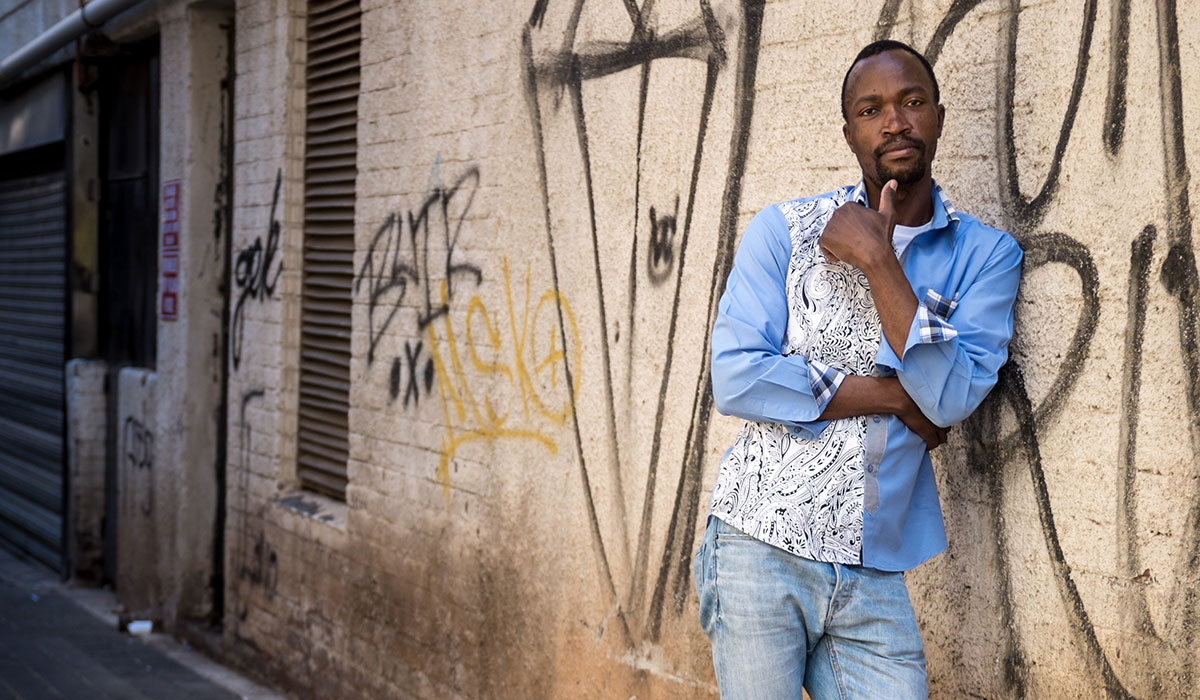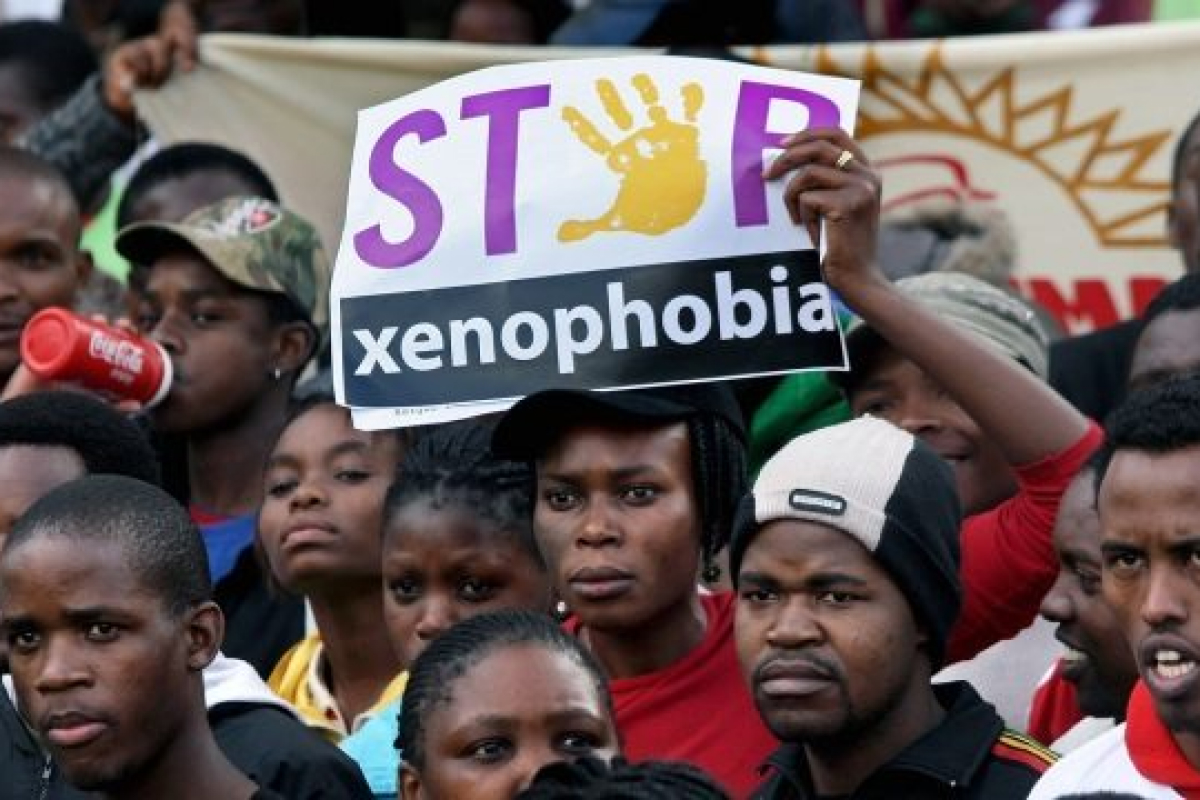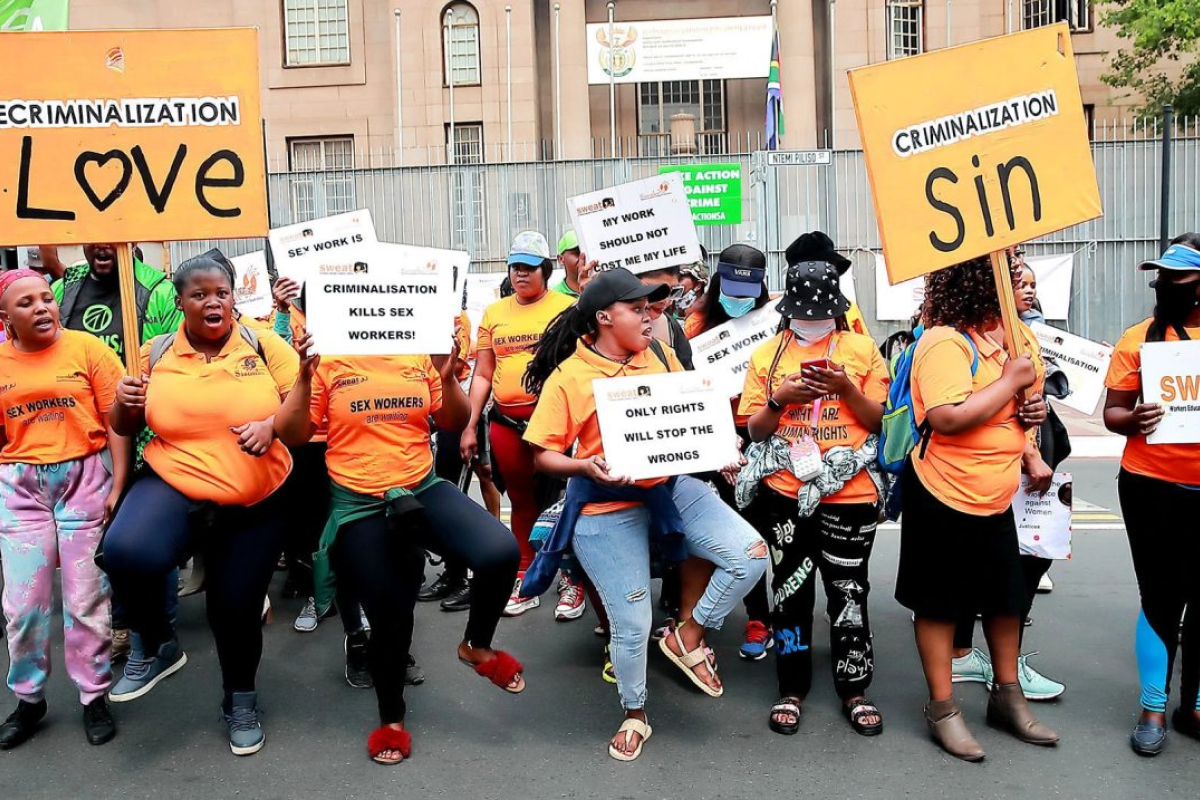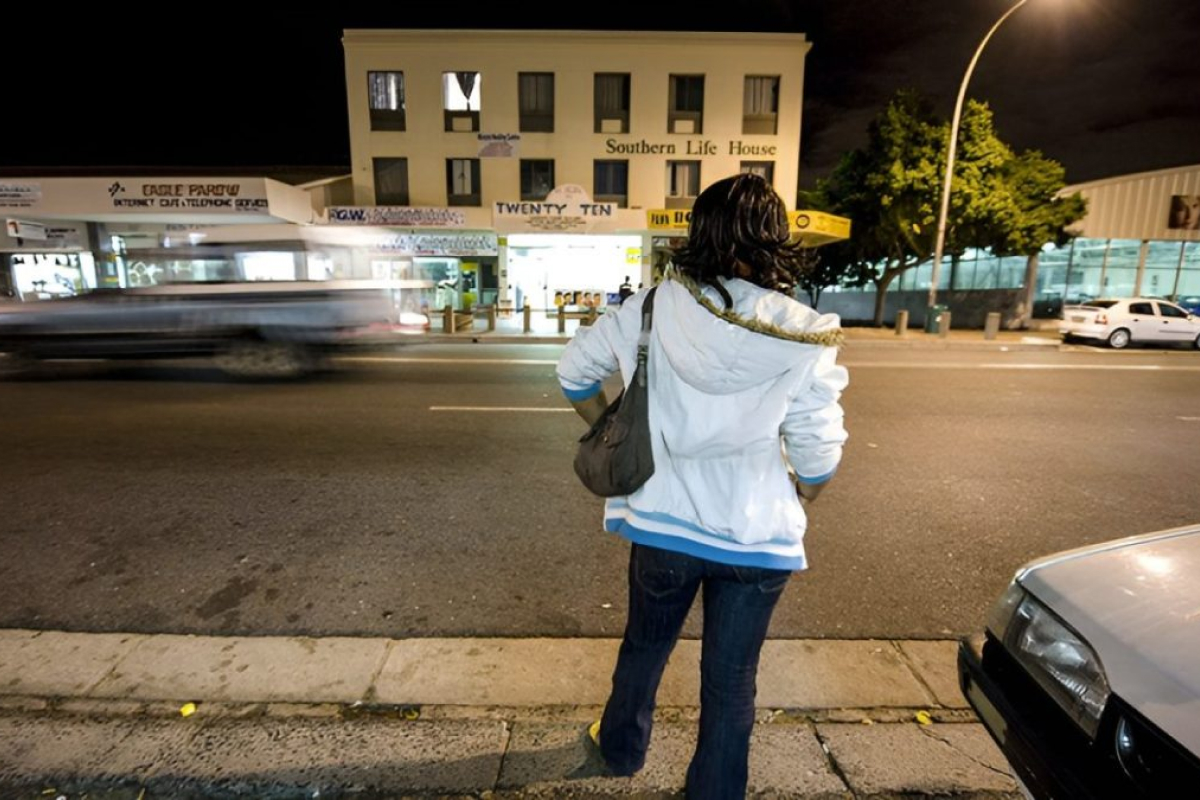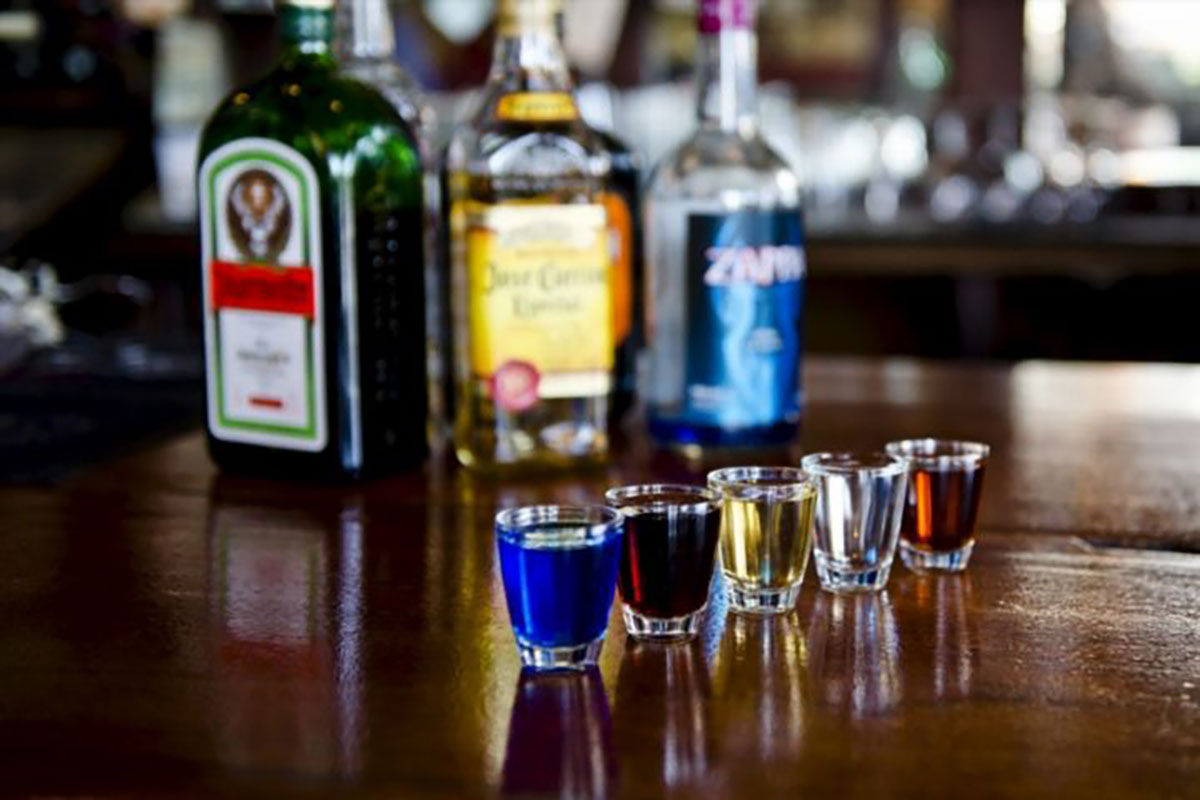“There is no victim/criminal dichotomy – most criminals are also victims of something.”
— Ariane Nevin, National Prisons Specialist for Sonke Gender Justice
I am reminded of these words as Thulani Ndlovu pops his head around the door at Sonke’s office in Braamfontein, Johannesburg announcing his arrival. It’s 10am – right on time. And as we greet, I notice how softly-spoken he is and wonder – besides being punctual – what nine years in maximum security prison does to a person.
Thulani’s story is not unusual for a country characterised by extreme inequality and sky-high crime rates. The latest crime statistics indicate that carjacking has increased by 14.3% over the last ten years while murder has increased 4.9% – with 51 murders occurring on average every day between 1 April 2015 and 31 March 2016.
Thulani never got to meet his father who left before he was born in Alexandra township. After moving with his mom to Zimbabwe as a baby, he returned to Gauteng a sixteen year old – the plan was to finish school and look for his dad. He moved in with his uncles – both criminals. Fraud was their thing – and they were good at it. “They had houses and flats in Berea, Yeoville – they dressed nice. I idolised them,” remembers Thulani.
Having an absent father figure is not unusual in South Africa where nearly half of the country’s children are growing up without dads and five million women are single mothers. Research shows that fathers’ involvement in the lives of their children has many positive effects including improving gender dynamics and decreasing violence. It is also linked to school completion, lower delinquency rates as well as less depression, fear and self doubt on the part of the child.
It didn’t take long before joining his uncles on jobs took precedence over schoolwork. “I’d go for one month and just see no reason because my uncles didn’t go to school but they were successful. So I started joining them into fraud.” Earning anywhere between R5000 and R15 000 a job, Thulani was hooked. He moved from fraud to robbery – supermarkets like Spar and Checkers. “Town was my territory. My uncles had this philosophy: when you’re still young you have to enjoy your youth. So that R15k? I asked my uncle what should I buy? He said spend it. So I bought a sound-system and enjoyed the rest with beers.”
His prison-free run ended in 1996 when Thulani got arrested for fraud. “I went to Sun City [Johannesburg Prison] for two weeks. My uncle bailed me out. It scared me. Inside prison you have to know your story because there’s these guys making a lot of noise talking on top of each other. It confuses you – you’re really lost. Someone is telling you instructions, ‘Sit down! Sit down! Sit down!’ – so you sit down. Another one is telling you his instructions: ‘Take off your clothes!’ I look at the other guys, they’re taking off their clothes and who am I not to? So you take off your clothes. ‘Get in the shower! You’re smelling!’ It’s a trick. An initiation. Because while you’re in the shower they’re checking your stuff for things you’ve got in your pockets – money, cigarettes. If they want something, like maybe you have belt that is expensive, they take it. Jeans or trousers – anything. You come out and say where are my clothes? You’ve got nothing. At that time it was still rough. I was in the communal area. It was trauma. It was one man for himself. You survived by fighting or knowing someone who had a story.”
The experience frightened Thulani enough for him to seek legal work with a construction company in Rivonia. But it was mid-winter and icy cold on site, so cold that when he opened the tap in the morning to mix concrete, nothing came out because the water was frozen solid. He thought: “Let me just sit at home for June and July, then look for work again.” But while he was waiting, his uncles called…
Over the next ten years, Thulani worked odd jobs like sorting laundry but always fell back on crime. As a result, like so many other young men in South Africa, he see-sawed in and out of prison. According to the Department of Correctional Services there are currently close to 160 000 prisoners in South Africa. Speaking on The Daily Maverick Show, Professor Lukas Muntingh, co-founder and project head of the Civil Society Prison Reform Initiative, says the crucial issue though, is not abut the number of people in custody today, but the turnover of people through the prison system on an annual basis. To estimate the annual turnover of inmates through the prison system Muntingh says, “Take your daily custody figure and multiply by three. When you’re looking at a figure of over 400 000 people – then it becomes significant.”
This high turnover rate together with the prevalence of HIV and TB in prisons, as well as the violent culture behind bars, has a damaging effect on ex-inmates. “These returning prisoners are often unwelcome, stigmatised and marginalised,” says Ariane Nevin, National Prisons Specialist at Sonke Gender Justice. “And their access to healthcare, employment and psycho-social services is limited or non-existent.” It also affects the communities they return to. “Masculinity norms fuelled by the prison culture are perpetuated,” says Nevin. “As well as TB and HIV infections. And trauma – for both prisoners and their families.”
Thulani would do anything he could to stay out of prison. One time he bought a docket from an investigating officer for R10 000. “I didn’t want to go to jail so I asked if there is any chance you can make this go away? He said: how much you got?” When no docket was found in court on three consecutive occasions, the case was dismissed.
A desire to buy a house for his newborn son and daughter and marry his girlfriend, led Thulani away from robbery with it’s low-yield results and towards cash-in-transit jobs. He wanted big bucks. Then he could get out of crime. Get a real job. “My plan was to make money, buy a house and get married. I needed to be responsible.” But for cash-in-transit jobs you need a gun. An AK47 to be precise and those don’t come cheap, especially when your connection is in Mozambique. “To get guns from Mozambique to [South Africa] is a lot of money. So that’s why we needed to do smaller jobs.”
In 2005 one of these smaller jobs would be his downfall. He was caught robbing an O’Hagans Pub & Grill with a 9mm gun and locked up in Morningside Police Station for two months awaiting trial. “They wanted to thoroughly investigate us. We went to court, come back but they found nothing that could link us to other crimes – so we were sent to Sun City. We were there for 8 months awaiting trial.” “Filthy, filthy,” is how Thulani describes the awaiting trial section in Johannesburg Prison back in 2005. “Overcrowded and dirty – there were not enough beds, just sleeping like sardines on beds and on the floor on mattresses.”
The current state of remand detention (people who have been arrested, have been refused or cannot afford bail), in South Africa is deplorable. The case of Titus Monyemoratho, a remand detainee in Vereeniging’s Groenpunt Correctional Centre recently made headlines because, despite having been behind bars since 2011, Titus has never been arrested for a crime. He is locked in this limbo space, “no larger than a small bathroom for 23 hours a day.” The room has a bed, sink and toilet. No books or TV are allowed. “The lights are never turned off.”
Sonke’s documentary on Pollsmoor Remand paints a similarly shocking picture of the conditions in which remand detainees are forced to live: blocked toilets and drains, one block of soap a month to use amongst 15 people, many of whom have skin conditions. In February 2016 the centre was at 302% capacity. Healthcare is poor or nonexistent as experienced by Mvelisi Sitokisi, a HIV-positive former inmate, who did not receive any ARVs for four months whilst behind bars. As a result of defaulting on his treatment, Mvelisi had to begin a second-line regimen of drugs on his release – a more expensive and complicated cocktail, which caused his CD4 count to drop and his viral load to increase. He also contracted TB whilst in remand. Justice Edwin Cameron visited the facility in April 2015 and reported: “The ablution facilities we saw were deplorable. No privacy is possible […] The thickness of the air and the lack of ventilation was palpable. It raises the obvious question whether the Department is adhering to its own norms and standards.”
So in fact, Thulani was lucky that he spent just 8 months in remand. At his trial, he was handed down 18 years – the maximum sentence for armed robbery plus five years for the gun and one for the ammunition. The sentences would run concurrently.
His life behind bars started in Sun City, Medium B. Conditions were frightful. “People sleep on the floor on a sponge mattress. People sleep even in the toilet. You sleep wherever. The worst thing is that those people who are there are doing sentences more than 12 years. They only get a chance to go outside to collect food in the morning and afternoon and one hour for exercise. It’s never cold. It’s too hot but what can you do?”
What Thulani did was read – a lot. Medium B doesn’t have a library so he would rely on the trolley that passed his cell every Tuesday. By the time it got to him, there would be a couple of tattered copies of Wilbur Smith left. “I read fiction like Danielle Steele, Jeffrey Archer. Romance, some crime thrillers, Dick Francis. Every Sunday newspaper – I read it. Newspapers taught me that there’s a lot going on in our communities, but only a few know about it. My drive was to seek more information.”
In 2007, he passed matric. It was studying that helped him get moved to the more humane conditions of Medium C in 2011. “That’s how I saw it – that education can help you get out.” Now he had a single cell, there was a school, sports activities, testing for HIV and training – even motivation sessions. He tutored Grade 10 economics and became a trained HIV facilitator. He became aware of the stigma associated with HIV amongst inmates, as well as the lack of knowledge about the disease. “People are still scared to test. People have no clue how HIV gets into the body, transmission – they have no clue.” To begin to change this he started facilitating HIV classes – a five day programme would end in a certificate for the participant. “I was teaching 30 people every day,” he says.
In 2012, having served a third of his sentence, Thulani left Sun City for Boksburg prison. Funding for an HIV project being run at the prison had dried up and so, other than the distribution of condoms, there wasn’t much in the way of HIV activity there. That changed when Thulani and some fellow inmates set up a support group. It was an uphill battle though, facing challenges such as prison officials who misjudged their intentions and saw them as a threat. They persevered and succeeded in mobilising inmates to get tested before moving on to educating them on HIV transmission.
In 2013, Thulani was alerted to a shortage of ARVs, with some inmates having missed their medication for up to four days. Shortages in staffing and logistical issues in getting the medication were blamed, but pressure exerted by Thulani, Section 27 and Sonke Gender Justice ensured the situation was resolved. “We went to the head of prison and said if something is not done we will take the matter to court. Suddenly extra medication was available.” The steady flow of ARVs was restored, but the HIV support group was disbanded by prison officials.
It was here that the seed of Zonk’izizwe Odds Development (ZOD), the non-governmental organisation co-founded by Thulani in 2012 was sown: “The challenges made us grow, to say we can do more if given the chance. When we pioneered the HIV support group – it was good because people started taking their tablets in front of their friends – there was no stigma. They’d tell me, ‘before you got here I’d take my pills at night but now everyone is free, everyone knows.’ When you hear that you say – Ja, I did a little.”
Thulani’s experience of the conditions within prison is an advantage when it comes to campaigning for prisoners rights.“I know the environment. I know the windows of the cell and I know the hassle [inmates] have when they say, ‘Guys lets open the window’, I know that there is somebody next to that window who wants it to be closed because it’s cold. But you can’t close that window because you have to fight TB. But that guy is cold. And if you insist on not closing that window it’s a war.”
ZOD seeks to motivate young people at schools, colleges and in communities and empower them to make informed decisions. Another key objective is to address the issue of reoffending by creating projects to hire ex-offenders.“Guys are getting skills in prison but when they get out they have a criminal record. So they do what they know and end up back in prison. When you come out your family gets excited for two weeks. After that they want you to put something on the table. Crime is often the only way.” Thulani has experienced this first hand. “It’s nearly 2 years now and no job. In the beginning [my family] feared I’d go back to crime. Now they’re not sure – do I even want to work? Because I’m only talking of this organisation.”
As well as HIV and TB education, Thulani also focuses on teaching life skills like family values. “We saw that 90% of the guys in prison idolised their uncles just like me – their fathers are not present.” And importantly, human rights of prisoners is a focus. “Inside, nobody is telling us about the opportunities, giving us hope – because it’s seen as a punishment. You get a guy arrested for shoplifting but because the prison is full, he will be taken to a centre where people are doing life for armed robbery or hijacking. For him to show that he fits in he has to show his masculinity. Shoplifting? That’s nothing! So crime is being idealised. If we can change that mentality, create an environment that is addressing behaviour change – then maybe we are talking about something.”
But it’s not always easy for Thulani to talk about his experiences. “When you get out of prison you want to forget.” Instead, he’s doing the opposite. There’s a lot of work to be done and sitting on the committees of the National TB Task Team, Human Rights Advocacy and Communications Working Group (HRAC) and other bodies, is helping to get his message out. Currently he’s working on an Ex-Inmate Indaba to be held in Johannesburg on 10 November to help ex-inmates get work. Invited, will be ex-offenders, officials from the Departments of Correctional Services and Education, NGOs and business. But, says Thulani, working on prison reform remains a challenge: “It seems like there is no-one taking an interest. The issue is that we are not trusted. Even our families don’t trust us much.” Thulani is doing everything he can to change that.
To contact Thulani or find out more about Zonk’izizwe Odds Development or the Ex-inmate Indaba call 071 702 0648 or email derrick.maziwa@gmail.com.
Read more
- HIV and related infections in prisons, The Lancet
- The Lancet podcast is available here.

